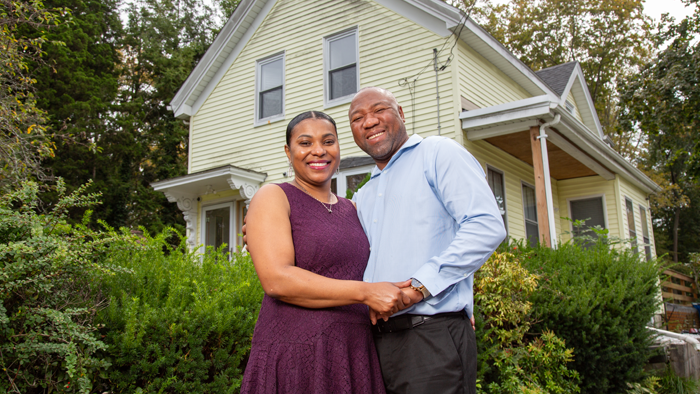
Frequently Asked Questions for Members
Homeownership is the primary way in which most people build wealth and opportunity in this country, specifically for first-generation homebuyers. To learn more about the program, please refer to the Lift Up Homeownership Procedures, which will be posted in early 2026, and Frequently Asked Questions listed below.
The Lift Up Homeownership program provides enhanced down-payment and closing-cost assistance to first-time homebuyers earning no more than 120% of the area median income, as defined by the U.S. Department of Housing and Urban Development (HUD). Through Lift Up Homeownership, grants are made to eligible homebuyers who meet FHLBank Boston’s definition of first-generation homebuyer. Lift Up Homeownership is one of three homeownership assistance programs offered by FHLBank Boston.
FHLBank Boston defines a first-time homebuyer according to regulation 42 U.S.C. §12704(14). In addition, at least one adult borrower must complete first-time homebuyer education/counseling from an organization approved by FHLBank Boston. Please refer to FHLBank Boston’s list of approved agencies.
FHLBank Boston defines a first-generation homebuyer as first-time homebuyers who self-certify that (i) the parents and/or legal guardian of at least one borrower does not currently own a home in the United States and has not previously owned a home in the United States, or (ii) at least one borrower has aged out of foster care.
No. The entire household does not have to be first-generation homebuyers. However, at least one adult who self-certifies as a borrower on the first mortgage loan application must be a first-generation homebuyer as defined by FHLBank Boston.
An income-eligible homebuyer identifying as a first-generation homebuyer can receive up to a $40,000 grant.
Yes. Lift Up Homeownership has a maximum asset cap of $150,000 to ensure grant funds are directed toward households with the greatest financial need. The cap includes both deposit and cash to close not to exceed the $150,000 limit.
No. This contribution must be $1,000 of the homebuyer’s own funds and not a gift or gift of equity. This contribution must be evidenced on the executed purchase and sales agreement or addendum. The homebuyer may receive an additional gift of gift of equity in the transaction. However, these sources of funds will not be considered the homebuyer’s own contribution.
Eligible properties are owner-occupied, primary residences purchased in New England and include one- to four-family homes, townhouses, condominiums, cooperative housing units, and manufactured housing deeded as real estate.
Yes. The Lift Up Homeownership program grant can be used to buy down a homebuyer’s interest rate by purchasing discount points (capped at 2 points).
Yes. The Lift Up Homeownership grant is forgivable after five years from the closing date, subject to complying with the program’s affordability provisions. Homebuyers will be required to sign a subordinate mortgage and note securing the affordability provisions. In the event of a sale, transfer, assignment of deed, or refinancing prior to the end of the five-year period, FHLBank Boston will conduct a repayment calculation based on net proceeds and the homebuyer’s capital investment in the property, to determine if funds are due to FHLBank Boston. In the event of a refinancing, FHLBank Boston will permit the Lift Up Homeownership grant to be subordinated at its sole discretion. Please work directly with all grant recipients before contacting FHLBank Boston’s housing and community investment team.
Yes. The Lift Up Homeownership program procedurally operates similarly to the EBP and HOW, including determining income eligibility, enrolling eligible homebuyers, requesting disbursement of grant funds, and monitoring. Please refer to the program Procedures and homeownership assistance programs income calculation guidelines, which will be posted in early 2026.
No. The Lift Up Homeownership grant cannot be layered or combined with FHLBank Boston’s EBP, HOW, or Affordable Housing Program. If a homebuyer meets the Lift Up Homeownership requirements, they can layer the grant with local, state, federal, and other down-payment assistance programs outside of FHLBank Boston.
